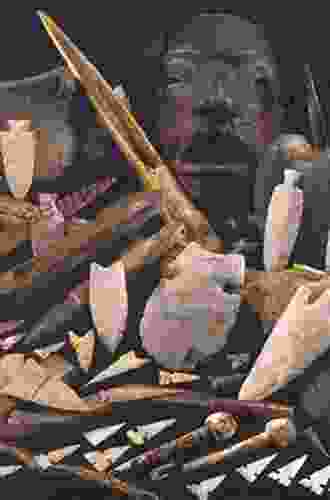An Ethnography of Visions: Masculinity and Fragility in the American South

In the American South, masculinity is often defined by violence, poverty, and racism. These three forces have shaped the lives of men in the region for centuries, and they continue to exert a powerful influence on how men understand themselves and their place in the world.
4.4 out of 5
| Language | : | English |
| File size | : | 7577 KB |
| Screen Reader | : | Supported |
| Print length | : | 148 pages |
This ethnographic study explores the experiences of men in the American South who have been affected by violence, poverty, and racism. The study draws on interviews with men from a variety of backgrounds, including white men, black men, and Latino men. The men in the study share their stories of how these forces have impacted their lives, and they offer their insights into the challenges and opportunities that men face in the South today.
Violence
Violence is a pervasive force in the lives of men in the American South. According to the Centers for Disease Control and Prevention, the South has the highest rate of homicide in the United States. Men are disproportionately likely to be both victims and perpetrators of violence.
The men in this study spoke about the many ways that violence has affected their lives. They talked about growing up in neighborhoods where shootings were common, and about losing friends and family members to violence. They talked about the fear and anger that they felt as a result of their experiences with violence, and about the ways that violence had shaped their sense of themselves.
One of the men in the study, a white man named John, grew up in a small town in Mississippi. He told me about how he was constantly bullied by other boys in his school. He said that he was often beaten up, and that he was even threatened with death on several occasions.
"I remember one time I was walking home from school, and this group of boys started chasing me," John said. "They were throwing rocks at me, and they were telling me that they were going to kill me. I was so scared that I ran all the way home, and I didn't stop running until I got to my front door."
John's story is not unique. Many of the men in this study had similar experiences with violence. They talked about being beaten up, stabbed, and shot. They talked about seeing their friends and family members killed. And they talked about the lasting impact that violence has had on their lives.
Poverty
Poverty is another major force that shapes the lives of men in the American South. According to the U.S. Census Bureau, the South has the highest poverty rate in the United States. Men are disproportionately likely to live in poverty, and they are more likely to experience the negative consequences of poverty, such as unemployment, homelessness, and hunger.
The men in this study spoke about the many ways that poverty has affected their lives. They talked about growing up in poor families, and about struggling to make ends meet. They talked about the shame and stigma that they felt as a result of their poverty, and about the ways that poverty had limited their opportunities.
One of the men in the study, a black man named James, grew up in a poor neighborhood in Atlanta. He told me about how he and his family struggled to make ends meet. He said that his parents worked long hours, but they still couldn't afford to put food on the table every night.
"We were always hungry," James said. "I remember one time my mom had to sell our furniture just so we could buy groceries. It was really embarrassing, and I hated that we were so poor."
James's story is not unique. Many of the men in this study had similar experiences with poverty. They talked about growing up in families that struggled to make ends meet. They talked about going hungry, and about living in rundown houses. And they talked about the ways that poverty had limited their opportunities.
Racism
Racism is a third force that shapes the lives of men in the American South. The South has a long history of racism, and it continues to be a major problem in the region today. Men of color are disproportionately likely to experience racism, and they are more likely to be victims of police brutality, mass incarceration, and hate crimes.
The men in this study spoke about the many ways that racism has affected their lives. They talked about being discriminated against in school, at work, and in the criminal justice system. They talked about being called names, being harassed, and being threatened with violence. And they talked about the ways that racism had made them feel less than human.
One of the men in the study, a Latino man named Jose, grew up in a small town in Texas. He told me about how he was often discriminated against because he was Latino. He said that he was called names, and that he was even beaten up on several occasions.
"I remember one time I was walking home from school, and this group of white boys started chasing me," Jose said. "They were calling me names, and they were throwing rocks at me. I was so scared that I ran all the way home, and I didn't stop running until I got to my front door."
Jose's story is not unique. Many of the men in this study had similar experiences with racism. They talked about being discriminated against, harassed, and threatened with violence. And they talked about the ways that racism had made them feel less than human.
The men in this study have experienced violence, poverty, and racism firsthand. These forces have shaped their lives in profound ways, and they have had a lasting impact on their sense of themselves and their place in the world.
The stories of these men are a reminder of the challenges that men face in the American South. They are also a reminder of the resilience and strength of these men. Despite the challenges they have faced, they have persevered and they continue to make a positive contribution to their communities.
The men in this study offer a valuable perspective on the challenges and opportunities that men face in the American South. Their stories can help us to understand the complex dynamics of masculinity in the region, and they can help us to develop more effective strategies for addressing the challenges that men face.
4.4 out of 5
| Language | : | English |
| File size | : | 7577 KB |
| Screen Reader | : | Supported |
| Print length | : | 148 pages |
Do you want to contribute by writing guest posts on this blog?
Please contact us and send us a resume of previous articles that you have written.
 Fiction
Fiction Non Fiction
Non Fiction Romance
Romance Mystery
Mystery Thriller
Thriller SciFi
SciFi Fantasy
Fantasy Horror
Horror Biography
Biography Selfhelp
Selfhelp Business
Business History
History Classics
Classics Poetry
Poetry Childrens
Childrens Young Adult
Young Adult Educational
Educational Cooking
Cooking Travel
Travel Lifestyle
Lifestyle Spirituality
Spirituality Health
Health Fitness
Fitness Technology
Technology Science
Science Arts
Arts Crafts
Crafts DIY
DIY Gardening
Gardening Petcare
Petcare Justine Kerfoot
Justine Kerfoot Nic Stone
Nic Stone Gabriela Rosa
Gabriela Rosa Paul Bodine
Paul Bodine Martin Liebscher
Martin Liebscher John Austin
John Austin Shelley Johnson
Shelley Johnson Dougald Macdonald
Dougald Macdonald Matt Wallaert
Matt Wallaert Foster Provost
Foster Provost Steve Bisheff
Steve Bisheff Leonard Susskind
Leonard Susskind Michael Paul
Michael Paul Steven M Bragg
Steven M Bragg Brian Christian
Brian Christian Sam Quek
Sam Quek Christine Ann Lawson
Christine Ann Lawson Samir Okasha
Samir Okasha Family Traditions Publishing
Family Traditions Publishing Mohamed F El Hewie
Mohamed F El Hewie Picabo Street
Picabo Street Brent Runyon
Brent Runyon Dory Willer
Dory Willer Tim Muehlhoff
Tim Muehlhoff Moon Travel Guides
Moon Travel Guides Jeff Szuhay
Jeff Szuhay Autumn Carpenter
Autumn Carpenter Bob Smale
Bob Smale Tiffany Wasson
Tiffany Wasson Paul Pilkington
Paul Pilkington Jayme Adelson Goldstein
Jayme Adelson Goldstein Dima Zales
Dima Zales Jim Fay
Jim Fay Kristin Fontichiaro
Kristin Fontichiaro Robert M Steward
Robert M Steward E Paul Zehr
E Paul Zehr Belinda Smith Sullivan
Belinda Smith Sullivan Linda Fairley
Linda Fairley Ed Jaworowski
Ed Jaworowski Lore M Dickey
Lore M Dickey John Quick
John Quick Asiphile Qulu
Asiphile Qulu Maureen Connolly
Maureen Connolly Brian A Hall
Brian A Hall Collins Dictionaries
Collins Dictionaries Morgan Murphy
Morgan Murphy Bernd Brunner
Bernd Brunner Jens Voigt
Jens Voigt Barbara Oakley Phd
Barbara Oakley Phd Claire Nance
Claire Nance Augustus M Walton
Augustus M Walton Paul Oliver
Paul Oliver Hillary Davis
Hillary Davis Steve Colgate
Steve Colgate Blake Boles
Blake Boles Audre Lorde
Audre Lorde Geoffrey Budworth
Geoffrey Budworth Terasa Cooley
Terasa Cooley Tony Nester
Tony Nester Patrisia Gonzales
Patrisia Gonzales John Hiker
John Hiker Dean Karnazes
Dean Karnazes Richard Miles
Richard Miles Arthur Benjamin
Arthur Benjamin Harry Bauld
Harry Bauld Babu The Panda
Babu The Panda Staff Of The Harvard Crimson
Staff Of The Harvard Crimson Manly P Hall
Manly P Hall James Nestor
James Nestor Lilith Dorsey
Lilith Dorsey Ayesha Ratnayake
Ayesha Ratnayake Aubre Andrus
Aubre Andrus Mark Baker
Mark Baker James Feess
James Feess Jacqui Letran
Jacqui Letran Patricia L Thompson
Patricia L Thompson Gary D Wale
Gary D Wale Beverly Conyers
Beverly Conyers Jermaine Marshall
Jermaine Marshall Gabriel Gambetta
Gabriel Gambetta Patty Hahne
Patty Hahne Dk Eyewitness
Dk Eyewitness Maya Angelou
Maya Angelou Luca Caioli
Luca Caioli Mark Gardener
Mark Gardener Larry Olmsted
Larry Olmsted Siddhartha Mukherjee
Siddhartha Mukherjee Mark Parman
Mark Parman Avery Faigenbaum
Avery Faigenbaum Maria Montessori
Maria Montessori Jessica Nabongo
Jessica Nabongo Hugh Acheson
Hugh Acheson Christopher Burris
Christopher Burris Andy Mcilree
Andy Mcilree John Misha Petkevich
John Misha Petkevich Robert Simons
Robert Simons Inga Aksamit
Inga Aksamit Hilary Scarlett
Hilary Scarlett Tori Bortman
Tori Bortman Martins Zaumanis
Martins Zaumanis Sarah B Bush
Sarah B Bush Brett Ortler
Brett Ortler Dr Jerisa Berry
Dr Jerisa Berry Bruno Barnhart
Bruno Barnhart James Ori
James Ori Philip Clayton
Philip Clayton James Garbarino
James Garbarino Rufus Stephens
Rufus Stephens Dana Wechsler Linden
Dana Wechsler Linden C M Gray
C M Gray Keith Mcnulty
Keith Mcnulty Vicki Hoefle
Vicki Hoefle Tracey L Moore
Tracey L Moore Yang Jwing Ming
Yang Jwing Ming Scott Mactavish
Scott Mactavish John S Ahlquist
John S Ahlquist Leonard Mlodinow
Leonard Mlodinow Nathan Clark
Nathan Clark Linda Dobson
Linda Dobson Mia Baxter
Mia Baxter Fred Alan Wolf
Fred Alan Wolf Spanked Teen
Spanked Teen Simon Askey
Simon Askey Peter Gieler
Peter Gieler Spike Walker
Spike Walker Darren Palmer
Darren Palmer Patrick Holford
Patrick Holford Vb Leghorn
Vb Leghorn Brandon Sneed
Brandon Sneed Lew Freedman
Lew Freedman Eitan Bar
Eitan Bar Lisa Gache
Lisa Gache Stan Fischler
Stan Fischler R F Egerton
R F Egerton Roy Benaroch Md
Roy Benaroch Md Thane K Pratt
Thane K Pratt Joe Friel
Joe Friel Cora Seton
Cora Seton Robert Warden
Robert Warden Mami Wata
Mami Wata Jonathan Cane
Jonathan Cane Rena Ejiogu
Rena Ejiogu Atlas Kane
Atlas Kane Aspen Matis
Aspen Matis Heather Heying
Heather Heying Gaby Melian
Gaby Melian Bradley Stone
Bradley Stone Sadie Keller
Sadie Keller Nick Fragel
Nick Fragel Aylette Jenness
Aylette Jenness Lucy Hopping
Lucy Hopping Chris Santella
Chris Santella Austin Ruse
Austin Ruse R Scott Thornton
R Scott Thornton Samantha Bongeka Nqoko
Samantha Bongeka Nqoko Beatrice Bruteau
Beatrice Bruteau John Skinner
John Skinner Jessica Seinfeld
Jessica Seinfeld Stephen Morris
Stephen Morris Ellyn Sanna
Ellyn Sanna Karl Fulves
Karl Fulves Reinhard Bonnke
Reinhard Bonnke Joanne Simon Walters
Joanne Simon Walters Antoni Porowski
Antoni Porowski Katie Cotugno
Katie Cotugno Levison Wood
Levison Wood Duncan J Watts
Duncan J Watts Cynthia Hand
Cynthia Hand Marc D Lewis
Marc D Lewis Casey Barber
Casey Barber Deborah J Rumsey
Deborah J Rumsey Greg B Smith
Greg B Smith William Woys Weaver
William Woys Weaver Daffodil Campbell
Daffodil Campbell Robert T Clemen
Robert T Clemen Shelly Rainforth Collins
Shelly Rainforth Collins Audrey Grey
Audrey Grey Robert Chuckrow
Robert Chuckrow Don J Sharpsteen
Don J Sharpsteen Kimberly Willis
Kimberly Willis Johnette Howard
Johnette Howard Aubrey Hargis
Aubrey Hargis Janet Gurtler
Janet Gurtler Mike Kim
Mike Kim Gabrielle Bossis
Gabrielle Bossis Robert W Sullivan Iv
Robert W Sullivan Iv Peter Levin
Peter Levin Mercedes Lackey
Mercedes Lackey N West Moss
N West Moss Robert E Howard
Robert E Howard Jennifer Love
Jennifer Love Steven Brill
Steven Brill Marc Kery
Marc Kery Cornelia Pelzer Elwood
Cornelia Pelzer Elwood Ervin Laszlo
Ervin Laszlo Deborah Hughes Hallett
Deborah Hughes Hallett Sara Zarr
Sara Zarr Fred Mitchell
Fred Mitchell Roger Lajoie
Roger Lajoie Rick Burgess
Rick Burgess Fran Zimniuch
Fran Zimniuch Susan M Sheridan
Susan M Sheridan Mike Mastracci
Mike Mastracci Hourly History
Hourly History Seth Kantner
Seth Kantner Johny Pitts
Johny Pitts Eric Jones
Eric Jones Richard Ferber
Richard Ferber Linda West
Linda West B F Skinner
B F Skinner Tony Clunn
Tony Clunn Prayer M Madueke
Prayer M Madueke Sarah Boslaugh
Sarah Boslaugh Joe Hutto
Joe Hutto Chloe Lukasiak
Chloe Lukasiak Lyn Millner
Lyn Millner Rajeev Lal
Rajeev Lal Ken Phillips
Ken Phillips Martin Rees
Martin Rees Catherine Rodgers
Catherine Rodgers Kira Breed Wrisley
Kira Breed Wrisley Kay Harris Kriegsman
Kay Harris Kriegsman Huw Price
Huw Price Nsca National Strength Conditioning Association
Nsca National Strength Conditioning Association Audrey Sutherland
Audrey Sutherland Richard Strozzi Heckler
Richard Strozzi Heckler Chris Burkard
Chris Burkard Terry Marsh
Terry Marsh Joe Kelsey
Joe Kelsey Stephanie Donaldson Pressman
Stephanie Donaldson Pressman Fred Provenza
Fred Provenza Lise Eliot
Lise Eliot Darryl Cunningham
Darryl Cunningham Kathy Hirsh Pasek
Kathy Hirsh Pasek Miriam Erick
Miriam Erick Pete Whittaker
Pete Whittaker Sanya Richards Ross
Sanya Richards Ross Kjell Erik Rudestam
Kjell Erik Rudestam David Landis
David Landis Lindsey Philpott
Lindsey Philpott T J Emerson
T J Emerson Laura A Roser
Laura A Roser Tracy Deonn
Tracy Deonn Ayn Rand
Ayn Rand Ron Dalby
Ron Dalby Heather E Schwartz
Heather E Schwartz Lori Foster
Lori Foster Bob Weeks
Bob Weeks Blake Dresden
Blake Dresden Lizzie Lane
Lizzie Lane Dave Ramsey
Dave Ramsey Tomasz Witkowski
Tomasz Witkowski Deborah T Goldberg
Deborah T Goldberg Florin Grancea
Florin Grancea Liz Carmack
Liz Carmack Alan Lightman
Alan Lightman Conrad Goeringer
Conrad Goeringer Paul Tukey
Paul Tukey Peggy Kaye
Peggy Kaye T Berry Brazelton
T Berry Brazelton Kevin Bales
Kevin Bales Gary Webster
Gary Webster Ernestine Gilbreth Carey
Ernestine Gilbreth Carey Marie Rutkoski
Marie Rutkoski Lawrence A Kane
Lawrence A Kane Ori Hofmekler
Ori Hofmekler Julia Albu
Julia Albu Simon Pridmore
Simon Pridmore Catherine Belknap
Catherine Belknap Dustin Hansen
Dustin Hansen Sofia Price
Sofia Price Karen Berger
Karen Berger Danny Staple
Danny Staple Jessica S Olson
Jessica S Olson Loren W Christensen
Loren W Christensen Don Orwell
Don Orwell Kathy Pike
Kathy Pike Kay Wills Wyma
Kay Wills Wyma Tom Rea
Tom Rea Avinash K Dixit
Avinash K Dixit Proprietary Edition Kindle Edition
Proprietary Edition Kindle Edition Darja Wagner Ph D
Darja Wagner Ph D Mandy Khoshnevisan
Mandy Khoshnevisan Karen Whitley Bell
Karen Whitley Bell Rudy Sanchez
Rudy Sanchez John Sharp
John Sharp Scott Turansky
Scott Turansky Eunice Pennington
Eunice Pennington Judith Z Kallenbach
Judith Z Kallenbach Jim Holt
Jim Holt Babatunde Peter
Babatunde Peter Colin Towell
Colin Towell Jerome D Smalls
Jerome D Smalls Edward Lee
Edward Lee George Orwell
George Orwell Vance Packard
Vance Packard Ethan Sawyer
Ethan Sawyer Nina W Brown
Nina W Brown Deborah Miller
Deborah Miller Katie Hoff
Katie Hoff Mary Jayne Baker
Mary Jayne Baker Ken Denmead
Ken Denmead Adam Parkinson
Adam Parkinson Kaleb Dahlgren
Kaleb Dahlgren Graham Frankel
Graham Frankel Brent Dykes
Brent Dykes Zhi Gang Sha
Zhi Gang Sha Yogi Ramacharaka
Yogi Ramacharaka Martha Raile Alligood
Martha Raile Alligood Jeff Vandermeer
Jeff Vandermeer Madeleine Roux
Madeleine Roux Sonia Mainstone Cotton
Sonia Mainstone Cotton Laurie Katz
Laurie Katz Tara Dixon Engel
Tara Dixon Engel Print Replica Kindle Edition
Print Replica Kindle Edition Kevin Kelly
Kevin Kelly Qukids
Qukids Jeannie Burlowski
Jeannie Burlowski The Car Crash Detective
The Car Crash Detective John Updike
John Updike Cat Coluccio
Cat Coluccio Leigh Pearson
Leigh Pearson Richard H Immerman
Richard H Immerman Quick Reads
Quick Reads Madelynne Diness Sheehan
Madelynne Diness Sheehan Carol Potter
Carol Potter M Prefontaine
M Prefontaine G R S Mead
G R S Mead Wilfrid Jonson
Wilfrid Jonson Ken Fry
Ken Fry Timothy J Jorgensen
Timothy J Jorgensen Charles D Garvin
Charles D Garvin Randi Kreger
Randi Kreger Harlan Coben
Harlan Coben Athena P Kourtis
Athena P Kourtis Ryan Sleeper
Ryan Sleeper E W Bullinger
E W Bullinger Sharon Baranoski
Sharon Baranoski Jerry Scott
Jerry Scott Dk
Dk Rachel Mitchell
Rachel Mitchell Nita Sweeney
Nita Sweeney Asia Citro
Asia Citro William Schoolcraft
William Schoolcraft Denny Emerson
Denny Emerson James Deetz
James Deetz Sharon Slater
Sharon Slater Carol Ann Rinzler
Carol Ann Rinzler Nfhs
Nfhs Rehan Haider
Rehan Haider Gareth Loy
Gareth Loy Drew Harris
Drew Harris Miriam Manela
Miriam Manela Peter Bronski
Peter Bronski Lamis Chebbi
Lamis Chebbi Elizabeth M Ward
Elizabeth M Ward Colleen Hoover
Colleen Hoover Temple Bailey
Temple Bailey Richard Boergers
Richard Boergers J C Pater
J C Pater Renzo Gracie
Renzo Gracie Lara Lillibridge
Lara Lillibridge Brooke Dojny
Brooke Dojny Ben Riggs
Ben Riggs Emily Whaley
Emily Whaley Smadar Lavie
Smadar Lavie Sam Pathy
Sam Pathy Kathy Jackson
Kathy Jackson John Littleford
John Littleford Matt Forbeck
Matt Forbeck Tarik Unal
Tarik Unal Janis B Meredith
Janis B Meredith Sandy Hall
Sandy Hall Ethan Gallogly
Ethan Gallogly Emenwa Global
Emenwa Global Daria Blackwell
Daria Blackwell Efrain Galeano
Efrain Galeano Nancy Friday
Nancy Friday Pedro G Ferreira
Pedro G Ferreira James Ladyman
James Ladyman Ben Sasse
Ben Sasse Larry Miller
Larry Miller Vasily Mahanenko
Vasily Mahanenko Jim Collins
Jim Collins Jeffrey Freed
Jeffrey Freed Jessica Nordell
Jessica Nordell Pat Mora
Pat Mora Jonothan Page
Jonothan Page Carolyn Wyman
Carolyn Wyman E Randolph Richards
E Randolph Richards Vivian Sandau
Vivian Sandau Augustine Wetta
Augustine Wetta Karen Skerrett
Karen Skerrett Joe Baird
Joe Baird Tom Humphries
Tom Humphries John Connor
John Connor Lois Lowry
Lois Lowry Barbara Blitzer
Barbara Blitzer Bill Thorness
Bill Thorness Susan F Paterno
Susan F Paterno Carl Safina
Carl Safina Alan Vermilye
Alan Vermilye Brigid Kemmerer
Brigid Kemmerer Mike Eruzione
Mike Eruzione Tara Sim
Tara Sim Kindle Edition
Kindle Edition Larry Dane Brimner
Larry Dane Brimner Bernie Chowdhury
Bernie Chowdhury Paul Parsons
Paul Parsons Timo Holmquist
Timo Holmquist Izabelle Winter
Izabelle Winter Greg Gatz
Greg Gatz William M Kelso
William M Kelso Greg Lavern
Greg Lavern Kenneth P Miller
Kenneth P Miller M D William W Forgey
M D William W Forgey Laura Riley
Laura Riley David J Miklowitz
David J Miklowitz David Acheson
David Acheson Don Casey
Don Casey Norman Ollestad
Norman Ollestad John D Mccann
John D Mccann Gemma Mccrae
Gemma Mccrae Barry Cunliffe
Barry Cunliffe Joe Ryder
Joe Ryder Leslie T Chang
Leslie T Chang Stewart M Green
Stewart M Green Dusty Phillips
Dusty Phillips Laurie Kennedy Malone
Laurie Kennedy Malone Kilian Jornet
Kilian Jornet Ashley Rhodes Courter
Ashley Rhodes Courter Mark Coeckelbergh
Mark Coeckelbergh Larry Gonick
Larry Gonick Esther M Toddler
Esther M Toddler Audrey Coulthurst
Audrey Coulthurst Robert M Bramson
Robert M Bramson Uta C Merzbach
Uta C Merzbach Patricia Stacey
Patricia Stacey Debora Rasio
Debora Rasio J A Baker
J A Baker Gerald Paul Clifford
Gerald Paul Clifford Casey Schreiner
Casey Schreiner Deanna Roy
Deanna Roy Conrad Anker
Conrad Anker Carly Gelsinger
Carly Gelsinger Gillian Bradshaw
Gillian Bradshaw David Shoalts
David Shoalts Nancy Owens Barnes
Nancy Owens Barnes Austa Somvichian Clausen
Austa Somvichian Clausen Steve Oakes
Steve Oakes Beverly Bell
Beverly Bell Jesus Salcedo
Jesus Salcedo Warren W Wiersbe
Warren W Wiersbe Eric S Raymond
Eric S Raymond Bubba Watson
Bubba Watson Larry Hart
Larry Hart S Ali Myers
S Ali Myers Mike Doyle
Mike Doyle Dan Morse
Dan Morse Patrick Hamill
Patrick Hamill Deborah Falaye
Deborah Falaye Dan Blanchard
Dan Blanchard George J Hademenos
George J Hademenos John Gierach
John Gierach Fennel Hudson
Fennel Hudson Charles L Thompson
Charles L Thompson Gail M Nelson
Gail M Nelson Conor Sullivan
Conor Sullivan Greta Eskridge
Greta Eskridge John Swinton
John Swinton Linda Wong
Linda Wong Lisa Fain
Lisa Fain Steven Rinella
Steven Rinella Suzanne Jurmain
Suzanne Jurmain Deanna Pecaski Mclennan
Deanna Pecaski Mclennan Shepherd Mead
Shepherd Mead Todd Mikkelsen
Todd Mikkelsen Cece Winans
Cece Winans Clive Finlayson
Clive Finlayson Michael Grimm
Michael Grimm David Code
David Code David Dalglish
David Dalglish John Gray
John Gray Penny Simkin
Penny Simkin Kathleen M Eisenhardt
Kathleen M Eisenhardt
Light bulbAdvertise smarter! Our strategic ad space ensures maximum exposure. Reserve your spot today!

 Anthony BurgessThe Man of Mastery and the Competitive Mind: Achieving Success Through Inner...
Anthony BurgessThe Man of Mastery and the Competitive Mind: Achieving Success Through Inner...
 Ernest HemingwayUnveiling the Mystery: A Comprehensive Analysis of Murder on Montellio by...
Ernest HemingwayUnveiling the Mystery: A Comprehensive Analysis of Murder on Montellio by... William PowellFollow ·19.5k
William PowellFollow ·19.5k Keith CoxFollow ·3.9k
Keith CoxFollow ·3.9k Gerald BellFollow ·7.7k
Gerald BellFollow ·7.7k Morris CarterFollow ·19k
Morris CarterFollow ·19k Peter CarterFollow ·13.4k
Peter CarterFollow ·13.4k Devin CoxFollow ·6.5k
Devin CoxFollow ·6.5k Cameron ReedFollow ·10.3k
Cameron ReedFollow ·10.3k Ira CoxFollow ·15.4k
Ira CoxFollow ·15.4k

 Jett Powell
Jett PowellHow to Choose a Church That's Right for You
Choosing a church...

 Bryan Gray
Bryan GrayThe Unbelievable World of Self-Working Close Up Card...
Imagine having...

 Junot Díaz
Junot DíazUnveiling the Enchanting Old City Laneways and Diavatika:...
Crete, the largest of...

 Jamison Cox
Jamison CoxA Year in the American Wild: Recreating a Feast from...
For one year, I lived off...

 Holden Bell
Holden BellArchaeology of Early American Life: An Exploration of...
The archaeology...

 Rodney Parker
Rodney ParkerRegain Your Fertility By Reversing Insulin Resistance,...
If you're struggling to conceive, you may be...
4.4 out of 5
| Language | : | English |
| File size | : | 7577 KB |
| Screen Reader | : | Supported |
| Print length | : | 148 pages |








